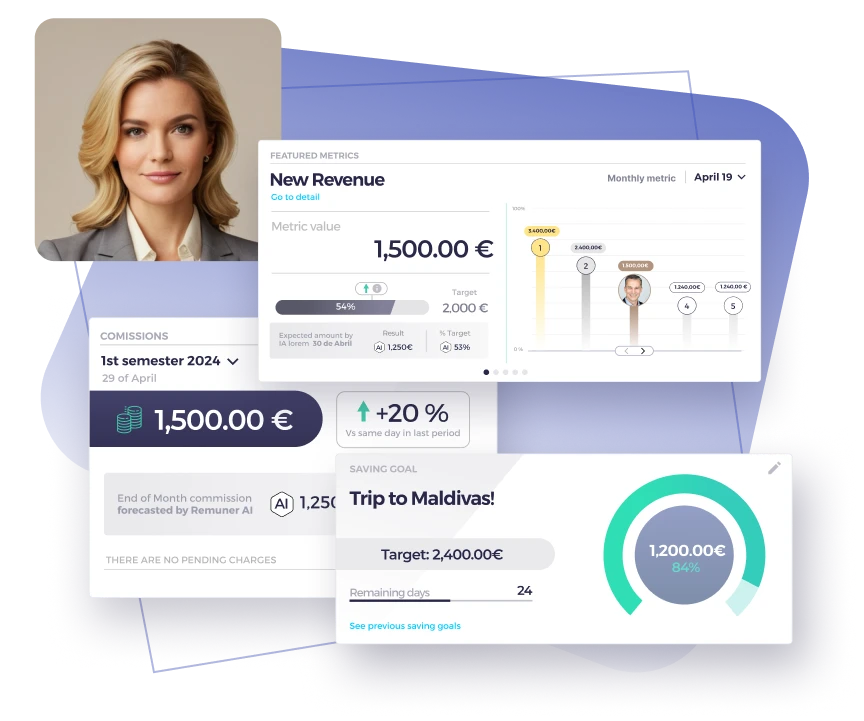Table of contents
Effective sales strategies are critical for businesses aiming to increase sales, attract potential customers, and achieve long-term growth. A sales strategy is a detailed plan outlining how your sales team will reach its sales targets, communicate your product or service value to prospective customers, and consistently win deals.
In this post, we’ll explore successful sales strategies, share real-world examples, and offer tips to improve your sales performance. We’ll also explain how solutions like Remuner can simplify managing sales incentives and compensation.
What is a Sales Strategy?
A sales strategy is a detailed plan designed by sales leaders to help their sales team effectively reach and convert potential customers. It defines clear sales goals, identifies your target market, and describes tactics your team should use to engage decision makers, address customer pain points, and close sales.
A strong strategy aligns your sales reps with clear, achievable sales targets, ensuring better conversion rates and predictable revenue growth.
Why are sales strategies important?
Sales strategies provide clear direction for your sales team. They help:
- Improve sales performance
- Align teams with clear sales goals
- Enhance conversion rates
- Build stronger relationships with prospective customers
- Increase market share and revenue
- Clarify your target market and sales messaging
Types of sales strategies
Sales strategies vary depending on business objectives, customer types, and industry specifics. Here are some of the most effective types you can implement to drive revenue growth:
1. Inbound sales strategy
Inbound sales strategies attract potential customers through content and relationship-building. Instead of actively reaching out, you create valuable content that draws prospects toward your business.
Example:
A software company regularly publishes helpful blogs, guides, and case studies that educate potential customers. When visitors engage, sales reps guide them through a consultative sales process, addressing their specific pain points.
2. Outbound sales strategy
This strategy involves proactively reaching out to prospective customers through cold-calling, emails, or social media to directly pitch products or services.
Example:
A sales rep targets a specific list of potential leads, sending personalized emails to introduce a new product. They then follow up with phone calls to move prospects down the sales pipeline.
3. Account-based selling (ABS)
ABS focuses on targeting specific high-value accounts rather than broad markets. Sales reps create customized strategies tailored specifically to key decision-makers within those accounts.
Example:
An enterprise tech sales team identifies 10 large companies that would greatly benefit from their solution. They develop targeted content, personalized presentations, and custom sales incentives to win these specific accounts.
4. Consultative selling
Consultative selling focuses on understanding and solving a customer’s problem rather than pushing a specific product. Sales reps become trusted advisors rather than simple sellers. Discover Hubspot’s Guide on consultative selling.
Example:
A sales rep conducts detailed discussions with potential customers to deeply understand their challenges. Then, they recommend tailored solutions that directly address those pain points.
5. Solution selling
Solution selling emphasizes solving the overall business problem instead of just selling a standalone product. This approach highlights the value your solution provides in achieving broader business objectives.
Example:
A rep selling financial software emphasizes how the product improves overall financial efficiency, reduces overhead, and streamlines reporting processes rather than just focusing on individual features.
6. Relationship selling
Relationship selling builds strong, long-term relationships with customers, focusing heavily on trust and customer service rather than quick sales.
Example:
A salesperson regularly checks in with existing customers, proactively offering support, sharing helpful information, and ensuring they’re getting maximum value, resulting in repeat purchases and customer loyalty.
7. Social selling
Social selling leverages social media platforms to engage and build relationships with potential customers. It focuses on providing value and establishing credibility online.
Example:
Sales reps share relevant content on LinkedIn, participate in industry conversations, and engage directly with prospective customers through comments and messages, building trust and generating leads organically.
8. Value-based selling
Value-based selling highlights the unique value and benefits your product or service provides, rather than just the price. It helps customers clearly see the ROI of their purchase.
Example:
A sales rep clearly demonstrates the long-term cost savings and improved productivity their solution delivers, positioning the price as an investment rather than a cost.
8 Effective Sales Strategies to Increase Sales
Implement these proven sales strategies to drive better results and achieve your business objectives:
1. Understand Your Target Market
Knowing your ideal customer is crucial. Clearly defining your target market helps your sales reps focus their efforts effectively.
Example: A software company identifies small business owners as their ideal customers. The sales team tailors messaging to their pain points, like simplifying operations or reducing costs.
2. Consultative Selling for Better Conversions
Consultative selling focuses on understanding customer pain points deeply and providing tailored solutions rather than just pushing products.
Example: A sales rep identifies a customer struggling with commission tracking. Instead of merely selling software, they demonstrate how Remuner’s commission tracking software specifically solves this issue.
3. Set Clear Sales Goals for Your Team
Clear sales targets keep your sales team motivated and aligned with company objectives.
Example: A sales leader sets quarterly quotas tied directly to revenue targets. Sales reps clearly understand their individual OTE (On-Target Earnings), motivating them to hit their goals.
4. Leverage Sales Incentives & Compensation Plans
Motivate your sales reps with effective sales incentives and clearly structured compensation plans.
Example: Using Remuner, a company designs a sales compensation plan with bonuses for exceeding quotas, encouraging higher sales performance.
5. Use Data-Driven Sales Decisions
Making decisions based on accurate data helps improve sales pipeline management and forecasting.
Example: Sales leaders analyze data from their CRM to identify which sales reps convert leads most effectively. They adjust sales strategies accordingly, increasing overall team success.
6. Engage Decision Makers Early
Engaging with decision makers from the start shortens sales cycles and improves conversion rates.
Example: A B2B sales rep identifies key decision makers on LinkedIn and engages them directly, clearly articulating how their product or service addresses specific business needs.
7. Optimize Your Sales Pipeline
Effective sales teams regularly review their sales pipeline to identify bottlenecks and optimize conversions.
Example: Sales leaders notice a high drop-off after demos. They provide additional training for their sales reps, resulting in a 20% improvement in demo-to-close rates.
8. Invest in Sales Training & Coaching
Continuous training ensures your sales reps are well-equipped to meet sales targets and effectively handle customer interactions.
Example: Regular workshops focused on consultative selling techniques help a sales team increase their conversion rates significantly.
How Remuner Simplifies Sales Strategy Execution
Managing complex sales incentives and compensation plans can be challenging. Remuner simplifies this process, enabling your sales team to focus on selling, not administrative tasks.
Remuner helps your sales team:
- Track commissions effortlessly: Automate commission tracking to avoid disputes and errors.
- Clearly define quotas and compensation: Provide transparency, ensuring sales reps understand their potential OTE.
- Motivate higher sales performance: Use data-driven insights to optimize your sales compensation plans, motivating your team to exceed quotas.
Explore how Remuner can streamline your sales incentives and compensation plans by booking a free demo here.
Real-World Examples of Successful Sales Strategies
Let’s explore two practical examples to understand how successful sales strategies work:
Example 1: Consultative selling in tech sales
A software startup targets medium-sized businesses struggling with compensation management. Their sales strategy involves:
- Identifying customer pain points related to manual commission tracking.
- Offering consultative solutions to streamline compensation plans.
- Demonstrating Remuner’s commission tracking software as an ideal solution.
- This consultative approach leads to a significant increase in sales and customer satisfaction.
Example 2: Data-driven decision-making in e-commerce
An e-commerce company analyzes its sales data regularly. They notice specific products perform better with certain customer segments. They adjust their sales strategy by:
- Focusing their marketing efforts on high-performing segments.
- Aligning sales reps’ quotas and incentives to drive these products.
- Using Remuner to manage incentive compensation clearly and transparently.
- As a result, they achieve higher conversion rates and increased revenue.
FAQs about Sales strategies
What is direct selling and how does it relate to sales strategies?
Direct selling involves sales reps selling products directly to consumers, often face-to-face. Effective direct selling requires clear sales strategies, including understanding customer needs, clear sales goals, and tailored incentives.
How can sales incentives improve sales performance?
Sales incentives motivate your sales team by aligning rewards directly with sales targets, enhancing motivation, productivity, and performance.
What role does compensation play in sales strategies?
Compensation plans like salary plus commissions or bonuses directly influence sales rep motivation and performance. Effective compensation plans ensure reps align their goals with company objectives.
How do I choose the right sales compensation plan?
Choose based on your business objectives, sales cycles, and product complexity. Use tools like Remuner to manage complex compensation structures and incentivize higher sales performance.
Why is commission tracking software important for sales teams?
Commission tracking software automates and simplifies compensation management, improves accuracy, provides transparency, and helps maintain sales rep motivation.
Conclusion
Implementing effective sales strategies is crucial to achieving your sales goals and long-term business growth. By understanding your target market, leveraging consultative selling, setting clear sales goals, and using sales incentives effectively, you can dramatically improve your sales performance.
Solutions like Remuner simplify complex tasks, such as managing sales compensation plans and commission tracking, allowing your sales team to focus on what they do best—selling.
Ready to implement effective sales strategies? Discover how Remuner can help you streamline your sales processes and motivate your sales team today.
![8 Sales Strategies to Reach your Sales Targets Successfully [Complete Guide]](https://www.remuner.com/wp-content/uploads/2025/05/sales-strategies.webp)




